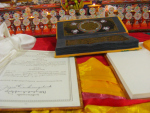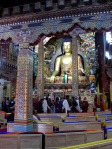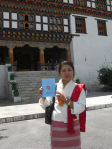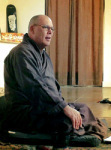Lisa Napoli's Blog, page 7
June 3, 2012
First cigarettes and plastic bags; now, cars are banned in Bhutan–on Tuesdays
The government of Bhutan says it means business. Four years after imposing a Pedestrian Day that’s never managed to be enforced, now, Tuesdays will be decreed “Pedestrian Day.”
Presumably this will be a bit simpler to enforce than it has been to ban sales of cigarettes and use of plastic bags.
Clearly, Bhutan’s combating the huge swell in traffic since loans made the purchase of cars a bit easier for a wider number of people, swelling the volume of cars to gridlock proportions. (Not quite like LA’s gridlock, thank goodness. Density is relative.)
If only we could pull this off in LA (talk of making a zone dedicated on Sundays to pedestrians and bikes is underway, however. Heck, if they can do it in Colombia….)
BHUTAN NEWS SERVICE It’s time for all to walk
Posted: 02 Jun 2012 12:48 PM PDT
Finally, the Prime Minister Jigmi Y Thinley’s government has decided to ban public and private motors on every Tuesday to celebrate the day as Pedestrians’ Day across the country.
Schoolgirls walking home from school in the town of Paro (Picture Courtesy: Getty Images)
The Prime Minister issued an executive order on June 1 to observe the Pedestrians’ Day from June 5 onwards.
Except service vehicles like ambulance, fire brigades, and vehicles of security forces will be allowed on Tuesdays, according to the order.
Furthermore, public buses and taxis will be plying once a month based on odd and even number plates. Bicycles are always allowed, the order mentioned.
The Ministry of Agriculture had proposed this plan some four years ago with an aim of promoting “no vehicle day” at least once a week.
A number of organizations have already assured the Prime Minister of their supports in implementing the move.








June 1, 2012
Latest review of Radio Shangri-La
This one in India, where the book came out last year:
Rahul Jain: Bhutan has of late hit the headlines in the global media because of the much-publicised marriage of its young Oxford-educated king, Jigme Khesar Namgyal, to a commoner, Jetsun Pema –an Asian version of Prince William’s marriage to Kate Middleton, minus, of course, the massive media coverage that the latter enjoyed.
These days, it has become an obsession, and a fashion, to talk of Gross National Happiness (GNH) in relation to Bhutan. It is a concept that owes its origin to the previous king of the Himalayan nation and father of the present incumbent, King Jigme Singe Wangchuk. The former king thought GNH to be a better reflection of the overall well-being of his countrymen than the universally accepted GDP measurement with or without the purchasing power parity concept.
Lisa Napoli’s book Radio Shangri-La is also conceptualised around the same theme and offers an excellent overview of what the Orient still craves for and what the Occident is looking forward to. Sadly, neither is available in the right degree to the craving souls of humanity.
This non-fiction account is premised around the setting up of Kuzoo FM, a radio service which is new to the Himalayan kingdom, where television was allowed in 1999 and Internet made its debut in 2006, leavened with reflections. Being a journalist has helped Lisa in observing events around her with acuity. In one sense, the book is autobiographical and in another, reportage, but then one needs to give in to the journalist in the writer.
It is a juxtaposition of Bhutan, a country just stepping into modernisation and democracy shepherded by its Oxford-educated king, and the 24×7 fastpaced life of an American back home.
Though the title of the book depicts Bhutan as the happiest kingdom on earth, the reality stands out in sharp contrast. For the record, a recently published report in a Bhutanese daily (another novelty in the country, since it was only in 2006 that Bhutan allowed two private newspapers to start publishing) said that farmers in the country spent more time in courts than on their farms. Agriculture is still the mainstay of the majority of Bhutanese.
The story has two protagonists, both swirling in a vortex of despair. One is a woman nearing 40, based in Los Angeles, trying to find the meaning of her life and/or feed meaning into it. The other is a Bhutanese young woman in her early 20s, working in an FM radio station and seeking to enjoy life in the fast lane, one punctuated by love and affection.
The book is timely and relevant in the sense that the Euro zone crisis, or rather, the global economic slowdown, has just driven home the point of happiness or its absence in materialism. Sadly, if the advanced countries are repeating the mistake with regularity, the developing and the least developed ones are failing to draw lessons from that. The bottom line then is that happiness remains a chimera as one finds it neither in the serene and picturesque Buddhist kingdom nor in the crass materialism of advanced countries.
RADIO SHANGRI-LA
Lisa Napoli Rabdom House Publishers, 2011
RS 399, 309 pages Paperback/Travel
However, it would be a mistake to assume that this is an occidental perspective of an oriental kingdom. In patches, of course, it is true that the author is trying to understand the whys and hows of the native. But she soon gets over it and shows herself throughout the book as a student of different cultures, one who is always at loggerheads with her own identity and self. The author feels that happiness as an idea is being sold even as the newly educated youths – a small but increasing percentage in a country of 6.5 lakh people – are transfixed between modernity and tradition, and in most cases, opting for the former. The other persistent theme in the book is Bhutan’s reluctant transition from monarchy to democracy, which understandably is a time-consuming process. Bhutan, for the record, went to polls in 2009 to bring about a democratic form of governance. But monarchy is still in the political blood of the Bhutanese. The transition to democracy, the role of all forms of media, the public perception of the transition to elected government induced and introduced by the King, and the general misconception and ignorance of the land-locked kingdom form the backdrop of the plot.
Scaffolding and land movers, like they dot Indian cities, are changing the landscape of Bhutan where urbanisation is taking place at a rate of knots. During the last decade Bhutan’s urban population has grown fourfold. Radio ShangriLa is also a commentary on the socioeconomic status of the Bhutanese society and its new-found worldliness. The author, however, also juxtaposes the ruling class’ misgivings about luxury on the domestic front with the government’s policy of welcoming high-net-worth tourists in order to help preserve the serenity of the land: a fact that the nation’s first elected prime minister, Jigmey Thinley, discussed with the reviewer during his visit to Guwahati.
The GNH concept of Bhutan has also been studied by Japan and other European countries, though not many in the USA have even heard of the country some 105 years after the world first saw traces of it through the much-maligned campaign by British General Younghusband through the photographs of General John Claude White, the commander of the Indian empire, which were first published in a National Geographic issue in 1914.
Overall, this is a good book for those who want to understand Bhutanese society, its politics, its society, its economy and its transition to democracy, although, as the author warns, “Bhutan is not a checklist kind of vacation on which you hit the hot spots, not an easy place, not a luxurious place to adore. It has many flaws and it is rife with contradiction”.








May 15, 2012
(#Radio) Shangri-La meets (Geography of #Bliss:) the #video
Here’s an edited version of the Live Talks LA-sponsored conversation at Track 16 in Santa Monica, where Eric Weiner interviews me (as opposed to a few weeks before when I interviewed him about his new book, Man Seeks God.)








May 8, 2012
Sheryl WuDunn on women, Pico Iyer on quiet, Karma and compassion in Beverly Hills
Couple events coming up:
Tonight, I have the honor of interviewing Pulitzer-prize winning writer Sheryl WuDunn about her book HALF THE SKY at the glorious Skirball.
On Monday, I’ll be speaking about Bhutan at All Saint’s Church in Beverly Hills as part of the “year of compassion” series-and my friend Karma Dem will be serving up fusion Bhutanese food.
And next Thursday, the celebrated writer Pico Iyer will be at UCLA’s Fowler Museum with me, discussing the joy of quiet and retreats. (Maybe we’ll even have a moment of silence.)








April 25, 2012
#Bhutan and Radio Shangri-La: This Sunday at @PacAsiaMuseum in #Pasadena
Very excited to be speaking this Sunday at the Pacific Asia Museum in Pasadena. It’s a gorgeous place, if you haven’t been, a gem of a museum.
When, where: 2 p.m. April 29. 46 N. Los Robles Ave., Pasadena.
Admission, info: Free with museum admission. RSVP to (626) 449-2742, Ext. 20.








April 20, 2012
“May the sun of #peace and #happiness shine over all people”

Three copies were signed by King and members of Parliament: one in Dzongkha, one in English, one in gold
I’ve just been asked if Bhutan’s constitution, signed in 2008 after the seating of its first elected Parliament, contains a promise of happiness.
The answer is yes: four times.
In the preamble: “…enhance the unity, happiness and well-being of the people for all time”
In Article 9: “The State shall strive to promote those conditions that will enable the pursuit of Gross National Happiness.”

Inside the hall of the Thimphu dzong, where the copies were placed on view for the public
In Article 20: “The Government shall protect and strengthen the sovereignty of the Kingdom, provide good governance, and ensure peace, security, well-being and happiness of the people.”
And in the last line of the national anthem:
“May the sun of peace and happiness shine over all people”

Everyone who came to see the newly-signed constitution was given a copy, and a little bottle of juice.
Now what about that rupee crisis!








April 19, 2012
#3goodthings
1. Those wonderful questions at Santa Monica College (followed by an equally wonderful thought-provoking lunch.)
2. Turning Hunter onto something she didn’t know (when she teaches me so much.)
3. The jacarandas have finally started to appear.
#3goodthings








Lovingkindness meditation by Rev. Kusala
 Last night, my friend the Buddhist monk, Rev. Kusala, spoke at All Saint’s Church in Beverly Hills. They’re doing a year long examination of compassion from various viewpoints, so he offered up the Buddhist perspective. At the end, he closed with the lovingkindness meditation that I first heard on his podcasts and which lured me in to the IBMC in Koreatown where he lives and works. Here it is:
Last night, my friend the Buddhist monk, Rev. Kusala, spoke at All Saint’s Church in Beverly Hills. They’re doing a year long examination of compassion from various viewpoints, so he offered up the Buddhist perspective. At the end, he closed with the lovingkindness meditation that I first heard on his podcasts and which lured me in to the IBMC in Koreatown where he lives and works. Here it is:
May I be happy, peaceful and free from suffering.
May no harm come to me/them.
May no difficulties come to me/them.
May no problems come to me/them.
May I/they always find fulfillment.
May my teachers and all teachers of the Truth be happy, peaceful and free from suffering.
May no harm come to me/them.
May no difficulties come to me/them.
May no problems come to me/them.
May I/they always find fulfillment.
May my parents, brothers and sisters, friends and relatives be happy, peaceful and free from suffering.
May no harm come to me/them.
May no difficulties come to me/them.
May no problems come to me/them.
May I/they always find fulfillment.
From the highest realm of existence to the lowest, may all beings arisen in these realms, with form and without, with perception and without, with consciousness and without, may they be happy, peaceful and free from suffering.
May no harm come to me/them.
May no difficulties come to me/them.
May no problems come to me/them.
May I/they always find fulfillment.
May I/they also have patience, courage, understanding, and determination, to meet and overcome, the inevitable difficulties, problems, and failures in life.
By the power of Truth found in the Buddha Dharma, may all my misfortunes due to stars, demons, harmful spirits, and ominous planets, be prevented and destroyed. May the rain fall in due time. May there be a rich harvest. May the world be prosperous. May the governments by righteous.
By the power of all the fully-awakened Buddhas, by the power of all the fully-awakened Pacceka-Buddhas, by the power of all the fully-awakened Arahants, by the power of all the fully-awakened Bodhisattvas, may I be secure and protected in every way.








April 18, 2012
Books in #Bhutan: The Mountain Echoes Literary Festival
Now in its third year. Could be the most expensive and faraway literary festival you’ll ever attend, unless you’re already in Bhutan. Certainly the most exotic!
A celebration of literature and writing from the Kingdom and around the region, from May 20-24th. With a Buddhist bent.
(And no, I’m not going.)
Here’s more information.








Momos in #Topanga (and a discount, too): Dorji and the #Bhutan Shop
 Anyone who drives through Topanga Canyon invariably alerts me to the presence of the Bhutan Shop there. To which I say, go in next time and talk to Dorji. He’s the proprietor, and the story of how he came to the US to purvey all things Bhutanese…well, it could be a book. Or at least a short story. Same deal with how he met his wife and brought her over here.
Anyone who drives through Topanga Canyon invariably alerts me to the presence of the Bhutan Shop there. To which I say, go in next time and talk to Dorji. He’s the proprietor, and the story of how he came to the US to purvey all things Bhutanese…well, it could be a book. Or at least a short story. Same deal with how he met his wife and brought her over here.
I just got this mail (below) from Dorji and am passing it along to you. He probably won’t mail order the momos, but he’ll likely find a way to ship you just about anything else.
Note: Ugyen is his wife, and if for some reason you need Bhutanese catering in the LA area, I’ll be happy to connect you, too, to my good friend Karma. (How can you resist a meal made by someone with that name?)
Hello my friends,
Ugyen’s “MOMOS” or dumpling sale was very successful with everyone who came last two Sundays to taste it. So we have decided to continue selling her momos every Sundays from now onwards. This sunday’s menu is only vegeteran momo on the occasion of Earth’s day, plus one order is free and if you like buy second one with regular price. We will take order your choice of momos and sauces to be prepared for you with qualified orders from next week onwards. Please, spread the good words for us and as well let your friends and family know about us. We will appreciate all your help.
Thank you.
Have a wonderful time always.
Bhutan Shop
Dorji
Visit Bhutan Shop and get 20% off of select items, only this sunday with this coupon or mention about it.











